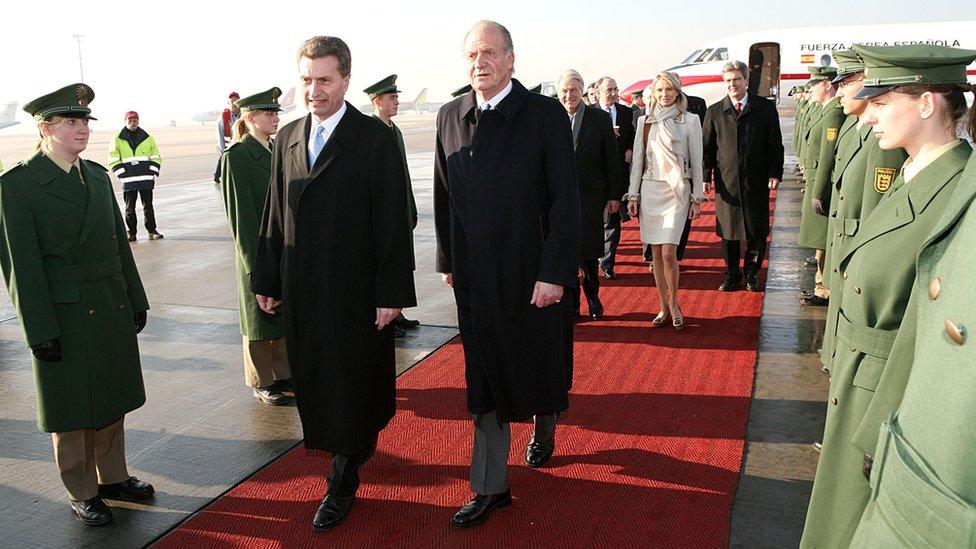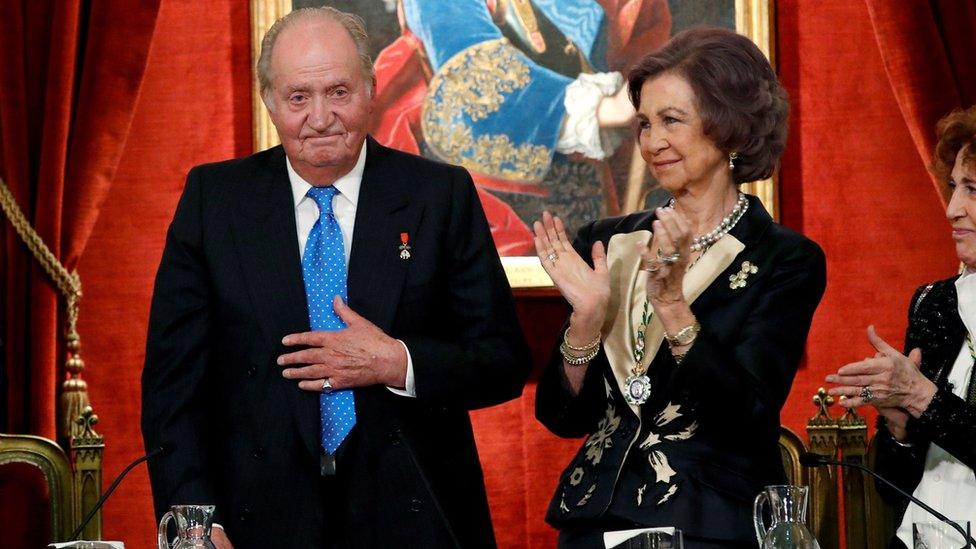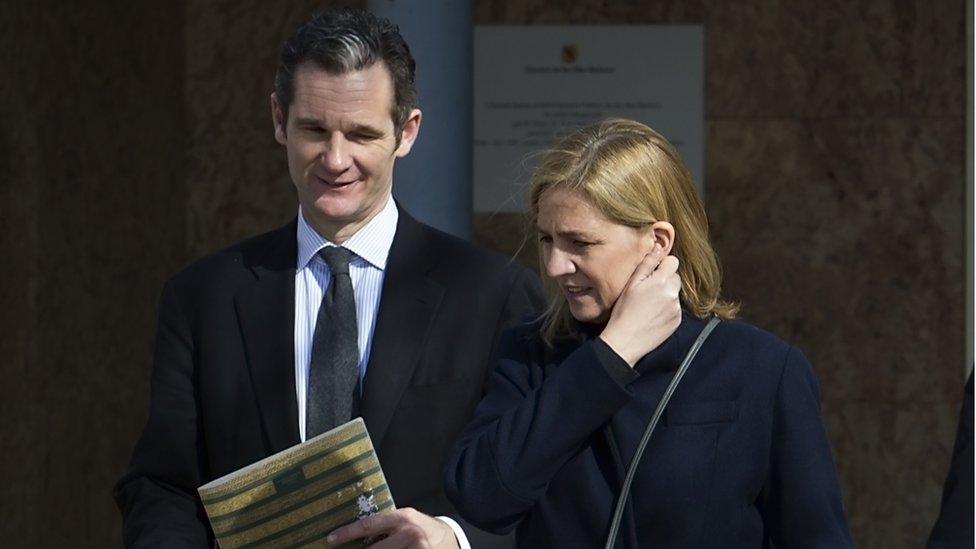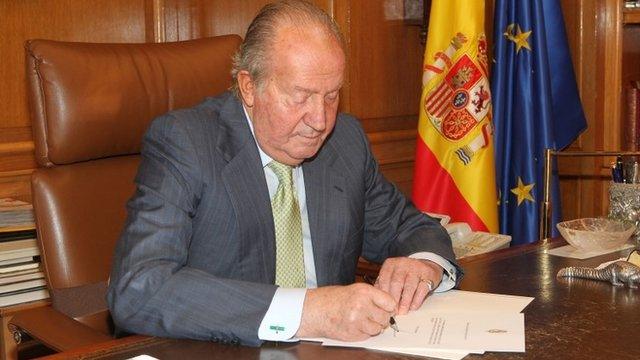Did Spanish spies harass ex-king's 'lover'?
- Published

Corinna zu Sayn-Wittgenstein speaks of a campaign of harassment that has gone on for eight years
A woman claiming to be a former lover of Spain's retired King Juan Carlos is accusing the country's intelligence services of waging a campaign of threats and intimidation against her aimed at protecting the interests of the monarchy.
Corinna zu Sayn-Wittgenstein, 55, a German-born businesswoman of Danish nationality, is due to lodge her case in the UK before the High Court.
Ms Sayn-Wittgenstein, whose maiden name is Larsen, says she had a "romantic relationship" with the man who ruled Spain from 1975 until his abdication in 2014. That relationship, she says, gave her access to information and documents concerning the financial dealings of the former monarch, who is now 82.
Elephant hunt outcry
The harassment and intimidation has been going on for eight years, she alleges, beginning with a notorious trip to Botswana that she and her son went on with Juan Carlos in 2012, when he was still on the throne.
During the holiday the king fell and injured himself and suddenly the lavish elephant-hunting trip and his relationship with Ms Sayn-Wittgenstein became public knowledge. It triggered an outcry in recession-ravaged Spain.

The former king's relationship is said to have lasted several years from 2004
"Following the Botswana trip and from conversations with the King Emeritus [Juan Carlos] and his entourage, it became clear to me that I was being perceived not only as persona non grata but also as a threat to the Royal Family," Ms Sayn-Wittgenstein said in a written affidavit.
She reports being followed by agents of the Spanish intelligence service, the CNI, while in Brazil, and that a group of armed men and Spanish agents occupied her apartment and office in Monaco for several weeks, on the pretext of making safety arrangements.
King Juan Carlos abdicated in June 2014, saying his son Prince Felipe would "open a new era of hope" for Spain
In reality, she alleges, they were trying to gain access to documents.
What was role of ex-head of intelligence service?
Ms Sayn-Wittgenstein also claims that Félix Sanz Roldán, the longstanding head of the CNI who retired last summer, threatened her and her family during a meeting the two had in the Connaught Hotel in London.

The intelligence service has not responded to the claims of intimidation
The allegations emerged in a TV interview given by a former police officer. However, Spanish prosecutors say the allegations are completely unfounded and have accused the ex-officer of slander.
She also attributes a mysterious break-in at a property of hers in Shropshire, in the UK, to the Spanish intelligence services and believes they are behind a campaign to discredit her in the Spanish media.
"The distinct sense of being a civilian woman at threat from a head of state and the head of his Secret Services began to make me very fearful," she said.
When contacted, the Spanish royal household would not comment on the case. The CNI did not respond to attempts to contact it.

Find out more about the Spanish royal family

Mystery of $100m payment
Spain's former king is also facing legal pressure on another front. A Swiss prosecutor is investigating $100m (£80m; €89m), which the Saudi monarchy allegedly gave to Juan Carlos in 2008.
According to the Tribune de Genève newspaper, the money was deposited in Mirabaud bank and in 2012, €65m (£57m; $73m) of it was given to Ms Sayn-Wittgenstein.
Geneva-based prosecutor Yves Bertossa is reportedly trying to find out if the money was part of a transaction. Specifically, he wants to know if it is linked to a €7bn contract, which Saudi Arabia awarded to a Spanish-led consortium in 2011 to build a high-speed train link between Medina and Mecca.
Representatives of Ms Sayn-Wittgenstein say that she received the €65m, but that it was a gift rather than a transactional payment or bribe. They also said that the payment of the initial $100m was long before the contract was awarded and therefore the two were not connected. Mr Bertossa has not yet commented publicly.
The leaked recordings that have shaken Spain
The catalyst for this legal action, and the focus of a wealth of political intrigue in Spain, is José Manuel Villarejo, the ex-police officer accused of slander.
Mr Villarejo is currently in preventive custody and under investigation for criminal organisation and extortion.
He has repeatedly shaken up Spanish public life by releasing compromising audio recordings of politicians and others.
In one of his leaked recordings, Mr Villarejo admitted to using prostitutes to elicit information from public figures.
He was also one of several people who received a copy of data from a mobile phone stolen from an adviser to the Podemos party leader Pablo Iglesias. In addition, investigators have found that he was on the payroll of BBVA bank.
One set of recordings leaked to Spanish newspapers El Español and Okdiario was of an alleged meeting Mr Villarejo had with Ms Sayn-Wittgenstein in London in 2015. In it, she appeared to say that Juan Carlos had hidden money abroad and that he had sought a commission for his role in brokering the high-speed rail contract.
The recordings led to the opening of a judicial investigation in Spain and it was eventually shelved, However, the anti-corruption office is still probing the concession of the high-speed train link.

The former king, who is now 82, has been married to Queen Sofía since 1962
Mr Bertossa's inquiry in Geneva, meanwhile, is more concerned with Juan Carlos's finances. In particular, he is examining the activities of financial associates of Juan Carlos in Switzerland.
Will Spain investigate the ex-king?
Juan Carlos has immunity from prosecution in Spain, but Ms Sayn-Wittgenstein's allegations go beyond the country's borders, as does the Swiss probe, meaning he could face an unfamiliar amount of scrutiny.
The king's son-in-law, Iñaki Urdangarin, is currently serving a prison sentence for embezzlement and money laundering in an unrelated case.
Spain's congress voted earlier this month not to set up a commission to investigate the finances of Juan Carlos. However, Podemos, which is part of Spain's leftist governing coalition, has said it will consider taking legal action to ensure there is a parliamentary inquiry.
Gabriel Rufián, a member of parliament for the Catalan Republican Left (ERC) said that the country's constitution "acknowledges equality except in the case of [the royal family] and that is where it's all different and they receive special treatment. We see this as undemocratic, at the very least".
Meanwhile, Ms Sayn-Wittgenstein's legal team has written to the UK Foreign Office and royal family, as well as its security and intelligence services, MI5 and MI6, warning that her allegations could have diplomatic consequences.
- Published13 June 2018

- Published2 June 2014
